|
|
|
Sort Order |
|
|
|
Items / Page
|
|
|
|
|
|
|
| Srl | Item |
| 1 |
ID:
151008
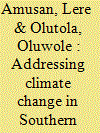

|
|
|
|
|
| Summary/Abstract |
Climate change is a global challenge. Its ramifying effects on both natural and human systems cut across different regions of the world. While Africa as a whole is being confirmed to be more affected by climate change due in part to a relatively low(er) mitigation and adaptive capacity, coupled with a situation where majority of its population depends mainly on natural resources, Southern Africa is singled out as a potentially vulnerable subregion for other additional factors. Representing a milestone in the trajectory of the global climate change process, the 21st session of the Conference of Parties (COP-21) resolved with a consensual climate change deal known as the Paris Agreement. The Agreement, through the instrumentality of a ratchet up mechanism, otherwise described as Intended Nationally Determined Contributions (INDCs), seeks significant cuts in greenhouse gas (GHG) emissions effectively from 2020. In essence, it calls for a novel though gradual shift from carbon-emission approach to low emission development strategy. This, no doubt, is indispensable to sustainable development at all levels. Beyond national commitments as obligatory for parties, there is a need for regional cooperative efforts which should bring about shared appropriate policy responses that promote green energy as well as seize opportunities inherent in it for national and deterritorialised gains. Adopting neoliberal and green theories, the institutional framework of the Southern Africa Development Community (SADC) where South Africa is expected to take a lead is examined in this article.
|
|
|
|
|
|
|
|
|
|
|
|
|
|
|
|
| 2 |
ID:
083439
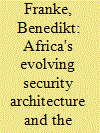

|
|
|
|
|
| Publication |
2008.
|
| Summary/Abstract |
Following decades of feeble attempts, Africa's states have recently made great strides in establishing an elaborate security architecture to tackle the continent's many perils. I argue that the emergence and particular structure of this architecture and its institutional layers are best described by the constructivist concept of multilayered security communities. While this concept is based on the original idea of security communities by Karl Deutsch and its later adaptation by Emmanuel Adler and Michael Barnett, it recognizes the increasing prominence of elaborate multi-level security cooperation in the developing world and the difficulties of the original theoretical framework to account therefor. Consequently, it combines security community terminology with notions such as organized complementarity and multi-level governance to do conceptual justice to systems like Africa's decentralized collective security arrangement.
|
|
|
|
|
|
|
|
|
|
|
|
|
|
|
|
| 3 |
ID:
103861
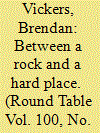

|
|
|
|
|
| Publication |
2011.
|
| Summary/Abstract |
This article explores the role and effectiveness of small state trade diplomacy in the negotiations to conclude Economic Partnership Agreements (EPAs) between the European Union (EU) and the African, Caribbean and Pacific (ACP) group of countries, focusing specifically on the Southern African Development Community (SADC). Given the vast power asymmetries between the EU and the ACP, small states have had limited bargaining power to shape the process and the outcome of the negotiations. Unlike most other ACP EPA negotiations, the SADC small states were also caught between a rock (EU) and a hard place (South Africa), with both parties competing to promote their visions for regional integration. In the end, the EPA process split SADC into four sets of separate trade regimes with the EU, undermining the established regional integration project. The article explains this divisive outcome of the SADC EPA process by analysing the negotiation behaviour of the main parties, specifically the 'weaker' players. The article concludes with key lessons for small states' future trade negotiations.
|
|
|
|
|
|
|
|
|
|
|
|
|
|
|
|
| 4 |
ID:
087415
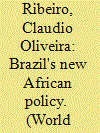

|
|
|
|
|
| Publication |
2009.
|
| Summary/Abstract |
Mindful of a shared colonial heritage, the left wing administration of president Lula de Silva has paid great attention to Brazil's diplomatic, political, economic and cultural relations with Africa
|
|
|
|
|
|
|
|
|
|
|
|
|
|
|
|
| 5 |
ID:
180894
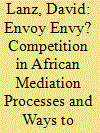

|
|
|
|
|
| Summary/Abstract |
This article seeks to make sense of the dynamics of competition in African mediation processes and to outline approaches for effective cooperation between mediators. To this end, it analyzes four cases of recent peace processes: Sudan (1994–2005), Kenya (2008), Madagascar (2009–2013) and South Sudan (2013–2015). The article identifies four driving forces of competition among mediators: clashing interests of states involved in mediation, overlapping mediation mandates, incompatible norms guiding conflict resolution, and mediators’ lack of performance. These factors risk undermining peace processes unless the involved mediators and guarantors take active steps to mitigate the negative effects of competition. This can be done through ‘hierarchical coordination,’ where a recognized authority takes the lead and allocates roles to other actors, or through ‘collaborative cooperation,’ where partners have unity of purpose and decide on a division of labor based on comparative strengths.
|
|
|
|
|
|
|
|
|
|
|
|
|
|
|
|
| 6 |
ID:
182426
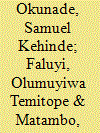

|
|
|
|
|
| Summary/Abstract |
Insurgency has gained prominence in Africa. It is usually associated with marginalisation, poverty, and inequality and often has religious links and bases. Insurgency frequently originates in communities situated along the borders of a country but soon spreads to neighbouring countries due to the poor response from the concerned state. The literature reveals that when state institutions ignore insurgent groups, they utilise that window of time to network with terrorist organizations such as Al-Qaeda and the Islamic State (IS) to solicit funds, arms and ammunition and training of new recruits and existing members. This was the case with Boko Haram, which was initially ignored by the Nigerian government only for it to become a security threat to the entire West African sub-region. An Islamic group, Ahlu Sunnah Wal Jammah (ASWJ) has recently emerged in Mozambique's Cabo Delgado Province with the aim of creating an Islamic state within the region. Drawing from the Boko Haram experience in West Africa, this article critically assesses the short- and long-term security threats that this group poses to Mozambique and the Southern African Development Community (SADC) and explores the strategies that could be deployed to combat the insurgency before it becomes a fully-fledged security challenge.
|
|
|
|
|
|
|
|
|
|
|
|
|
|
|
|
| 7 |
ID:
180626
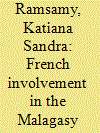

|
|
|
|
|
| Summary/Abstract |
In March 2009, President Marc Ravalomanana of the Island of Madagascar was ousted during a coup d’état led by the Mayor of Antananarivo, Andry Rajoelina, and his supporters. After the coup, Ravalomanana and his family fled to South Africa where they remained in exile from 2009 to 2014. To restore constitutional order in Madagascar, the Southern African Development Community (SADC), in July 2009, took the lead in a mediation process involving all Malagasy and other key stakeholders. SADC’s mediation efforts, led by former President Chissano, formally ended in 2013 with the holding of democratic elections. The mediation effort, which lasted five years, was conducted in a very competitive and ‘crowded’ field. The ‘crowded’ field was characterised by in-fighting amongst the various international bodies for power and influence including ‘spoiler’ tactics used by vested interests to hinder the mediation process and prevent the return of Ravalomanana to Madagascar. This article looks specifically at the ‘spoiler’ role that France played during the mediation process to safeguard her interests in Madagascar under the Sarkozy Administration. France is known to intervene in the political and economic affairs of her former colonies and, during the 2009 coup, this was no exception.
|
|
|
|
|
|
|
|
|
|
|
|
|
|
|
|
| 8 |
ID:
140783
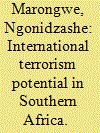

|
|
|
|
|
| Summary/Abstract |
This article discusses the potential factors for the development of international terrorism in southern Africa. While the region has seemingly been spared the terror attacks that have ravaged most other parts of the continent, and the globe at large, it is not immune to these attacks. Using a survey of the Southern African Development Community (SADC) countries, particularly the Democratic Republic of the Congo, Mozambique, South Africa, Mauritius, Zimbabwe, and Tanzania, which illuminate some of the permissive factors, the article asks, largely, first, to what extent is southern Africa at risk of global terrorism? And, second, in what ways can southern African states reduce the risk of terrorism in the region? Broadly, the article contends that, like most developing countries, including those from other parts of Africa, there exist permissive, both root and trigger, factors including insecure borders, democratization challenges, poverty, urban centers and variegated forms of both sub-state and state terrorism, that could provide useful platforms for the growth of international terrorism.
|
|
|
|
|
|
|
|
|
|
|
|
|
|
|
|
| 9 |
ID:
146921
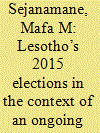

|
|
|
|
|
| Summary/Abstract |
After inconclusive elections in 2012, Lesotho had a coalition government for the first time, made up of three political parties that had a narrow majority in parliament. The new government, however, faced several challenges, some of which were of its own making. The agreement among the three parties was to literally divide the government into three parts, leading to a continuous stalemate in its operation; the most serious consequence was the prorogation of parliament and the resultant attempted coup. The flight of the prime minister to South Africa and his return under a Southern African Development Community (SADC) security detail provided a short-term solution to Lesotho's security crisis. Under Cyril Ramaphosa's mediation, the prorogued parliament was conditionally opened and the election date set for 28 February 2015. However, the security dilemma – whereby the prime minister, who is also minister of defence, has no control over the military – remains. When elections are held, there does not seem to be a guarantee that they will be held in peace; moreover, there are now fears that the losers will not accept the results of the elections because of the security vacuum in Lesotho. This article argues that peace can only be salvaged by enhanced SADC security before, during and after the elections. It argues that the SADC mission should remain beyond the elections to oversee the constitutional changes that are necessary for ensuring long-term stability. On their own, Lesotho politicians are unlikely to be able to work together in order to move the country forward.
|
|
|
|
|
|
|
|
|
|
|
|
|
|
|
|
| 10 |
ID:
111766
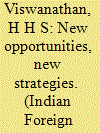

|
|
|
| 11 |
ID:
178127


|
|
|
|
|
| Summary/Abstract |
In Latin America and Southern Africa, norms on violence against women have developed with ups and downs, not simply in reaction to global norms, but sometimes even preceding global norm diffusion or surpassing it in terms of scope, framing and binding character. The classic global-to-local account with a single source of norm creation cannot capture these dynamics. Including the regional level in a dynamic model of norm diffusion enables us to understand the changing contents of a norm and to acknowledge transregional agency. We show (1) how norm contestation is an ongoing, multidirectional and polycentric process; (2) how the regional level opens up opportunities for feminists and femocrats; and (3) under which conditions regional norms can be both more progressive than global ones and more adapted to regional needs, and, in turn, are thus able to strengthen the ‘global’ norm.
|
|
|
|
|
|
|
|
|
|
|
|
|
|
|
|
| 12 |
ID:
141894


|
|
|
|
|
| Summary/Abstract |
This article investigates the regional dynamics of African agency in the case of negotiations on an Economic Partnership Agreement (EPA) between the EU and a group of Southern African countries, known as SADC-Minus. I argue that these negotiations were shaped by a pattern of differentiated responses to the choice set on offer under the EPAs by SADC-Minus policy makers and by a series of strategic interactions and power plays between them. I offer two contributions to an emerging literature on the role of African agency in international politics. First, I argue for a clear separation between ontological claims about the structure–agency relationship and empirical questions about the preferences, strategies and influence of African actors. Second, I suggest that, in order to understand the regional dynamics of African agency, it is important to pay close attention to the diversity and contingency of African preferences and to the role of both power politics and rhetorical contestation in regional political processes.
|
|
|
|
|
|
|
|
|
|
|
|
|
|
|
|
| 13 |
ID:
175965
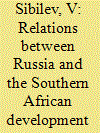

|
|
|
|
|
| Summary/Abstract |
RUSSIA established official relations with the Southern African Development Community (SADC) in March 1999 by appointing its then ambassador to Botswana, Valery Kalugin, as its official representative to SADC. This regional organization dates its history to 1980, when nine countries established what is known as the Southern African Development Coordination Conference (SADCC) and is the forerunner of the Southern African Development Community (SADC). A declaration issued by the SADCC founding member countries and newly independent Namibia and a treaty signed by them established SADC in August 1992.
|
|
|
|
|
|
|
|
|
|
|
|
|
|
|
|
| 14 |
ID:
061997
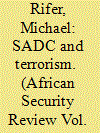

|
|
|
| 15 |
ID:
057185
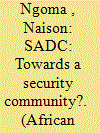

|
|
|
| 16 |
ID:
052916
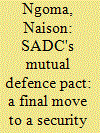

|
|
|
| 17 |
ID:
106674
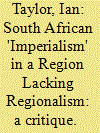

|
|
|
|
|
| Publication |
2011.
|
| Summary/Abstract |
The expansion of South African capital throughout southern Africa notwithstanding, the values and type of regionalism that Pretoria (at least rhetorically) wishes to promote in the subcontinent through the Southern African Development Community (sadc) jars considerably with the extant modalities of governance in many of the states in the region. While market-led integration may be moving apace, political commitment to any supranational regional project remains-and is likely to remain-muted and arrested. South Africa's ability to thus become an alleged political 'leader' of southern Africa and/or exercise 'imperialism' is less significant than many think or fear. Studies of regionalisation in the region need to be grounded firmly within the realm of political economy.
|
|
|
|
|
|
|
|
|
|
|
|
|
|
|
|
| 18 |
ID:
082332
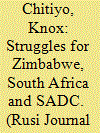

|
|
|
| 19 |
ID:
178259
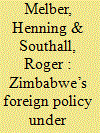

|
|
|
|
|
| Summary/Abstract |
Under the presidency of Mnangagwa, Zimbabwe’s foreign policy is characterized by the desire to ‘re-engage’ with the West with a view to securing the removal of sanctions and encouraging investment. In this, it has received the backing of the African Union and Southern African Development Community states. Simultaneously, the violence of the Mnangagwa regime has reinforced the reluctance of the West to remove sanctions, and Zimbabwe has even begun to test the patience of its neighbours. The government has placed renewed faith in the ‘Look East Policy’, but China is seeking to match its investments with tighter control.
|
|
|
|
|
|
|
|
|
|
|
|
|
|
|
|
|
|
|
|
|